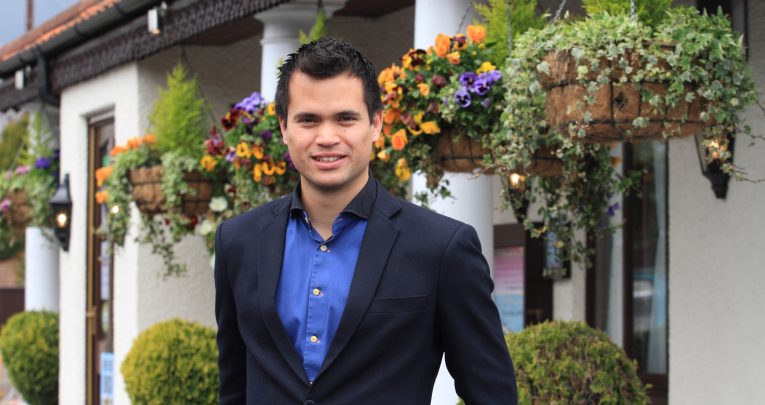“I Want To Make Teaching Prestigious” – The Trader Hoping To Pay Teachers £60k per year

Meet the former RAF pilot turned hedge fund manager on a mission to replace a system he sees as 'Failing our teachers and our kids…'

- by Callum Fauser
- Editor of Teach Secondary magazine

After spending seven years flying for the RAF, Siam Kidd decided to leave and become a full-time market trader and investor.
Having started trading at the age of 18, he recalls that six years in something ‘clicked’, prompting him to change careers. Prodding from friends and family members to share the secret of what had by then become a lucrative pursuit – Kidd has talked of buying his first Aston Marin at the age of 23 – later resulted in the launch of The Realistic Trader, a company set up to teach customers how to profit from currency markets.
Why are we discussing him here? Well, he’s since announced his intention to launch ‘a network of free schools across the country.’ As detailed in a talk he gave at the TEDx NorwichEd event earlier this year, he has developed an early 13-point school philosophy (see below), that he hopes to refine and build upon through consultation with experienced educational professionals.
We caught up with him after his talk to unpack a few of those 13 points, find out what’s driven his interest in education – and why he plans to pay teachers £60k p/a…
Can you explain more about what your plans for ‘a network of free schools’ involves? At the moment we’re at the ‘proof of concept’ phase. In my talk I outlined 13 things that I personally would like to see schools offer, but before I do anything else I want to hold a large conference – a week-long brainstorming session with the best minds I can find inside and outside the education system, be they scientists, researchers or teachers from countries such as Finland and Norway, which have the world’s best performing schools. I want to gather them together and put a number of questions to them.
Once we’ve answered those, we’ll have a blueprint of what the best possible schooling system could look like. I know that the system we have at the moment is failing our teachers and our kids, and that keeping things the way they are is not the way to go. We’ll start off by setting up one school and see how that goes. I must stress, though, that these schools won’t be for everyone. The kids will be set up not for the employment world, but to be employers and producer who create businesses and jobs.
What’s motivated you to become involved in education? There are two things that drive me. The first is that for a number of years I’ve felt the schooling system to be lacking massively. I was fortunate enough to go to a very good private boarding school in Holt called Gresham’s. The facilities were wonderful, but among the pupils, it was always really ‘uncool’ to learn and do well. I remember my first year there – I was what you’d call a geek, always with my hand up to answer questions, always studying diligently and immediately out of the ‘cool gang’. Working hard got beaten out of you.
It’s because of that and other things I mention in my talk that I feel the school system’s lacking – but then I realised that I’m in a position to try and help, and that I should get off my arse and actually do something about it. I know that this isn’t a quick fix – it’s going to be a 40-plus year project for me.
The second reason for getting involved is that I’ve got a baby on the way – and that I personally don’t trust any school with my kid.
That’s a strong statement – why is that? My wife has a number of friends who are teachers, and I meet pupils when I give talks at schools about how they can achieve their ambitions. This might rub some people up the wrong way, but through both of those I’ve found that there are two types of teachers: closed-minded, 9-to-5 teachers just doing this as a job and not inspiring their kids, and another group – most of them, in my experience – who believe that schools need changing in some way. This second group see themselves as being handcuffed by the many pressures and targets placed on them.
Another reason why I wouldn’t trust my kid in any school now is that a lot of the information that kids are being taught is just bad. Schools currently seem set up to send as many people into employment as possible. The thinking goes, ‘Get good grades, do well in school, get a good job, work for decades and retire on a pension if possible.’ Go back 50 years and that used to be good advice – but right now, it’s probably the worst advice you can give a kid.
It’s pointless to spend 40+ hours a week working, when you can realistically semi-retire in five to 10 years. Once you’re freer in terms of time, you can dedicate your time and resources to doing more. The kids in our school will realise that it’s not their sole purpose in life to work in a job forever, but to actually give back, create jobs and create new things.
One of your 13 points is paying teachers £60k – what difference do you think this will make compared to what we have now? One of the things I want to do is make the profession of teaching prestigious, respected and celebrated, as it is in Norway, Finland and elsewhere. From where I’m standing, this seems like a quick fix – teachers are quitting the profession in droves right now, because of the targets and stress, but also because of the very poor pay.
Pay is one of the areas I hope to address at the super conference’, but I’ve seen research from the US that says happiness goes up dramatically until you’re earning $85,000 p/a; money earned above that won’t really increase your happiness all that much. That $85k level is a kind of benchmark. Also, would you want your kids to be taught by someone who has mortgage troubles or debt problems? Because that person’s mind won’t be 100% on the best way they can look after your kids that day. I know at least 10 teachers who are really struggling and not doing the best job they can do, because of money troubles.
Your 13 points also mention martial arts – what will this involve? I’ve practised martial arts all my life from when I was a kid, and it teaches you so much more than just fighting. Ask anyone who’s done a martial art for at least a few years and progressed within the grading system, and they’ll tell you that respect and discipline become engrained within you. You grow to naturally respect your elders and be courteous and polite to others.
Kids will have the option to do martial arts if they wish, but self-defence classes will be compulsory. We would hold them on a continuing basis – perhaps termly or even quarterly – but often enough so that kids can protect themselves.
Finally, you mention that this school won’t be for all children – what would a boy or a girl graduating from the school look like, and what their family background be? Every business owner parent I’ve spoken to about this loves the idea, because most of them understand that we’re going through an entrepreneurial and technological revolution. In 10 years, a lot of the jobs we have now will have disappeared through automation, robotics, computing and many other things.
When the kids leave, they will be business owners. I foresee the school helping to set the kids up with a business or venture of some sort when they’re 16. The kids will receive advice from mentors and business owners, and by the time they’re 18 they’ll have had two years’ hands-on experience of running a business. They’re going to learn a lot if they fail in the course of that venture – and some will – but by the time they leave they’ll have had a very good grounding in business.
Longer term, if it’s a success and we’re able to open a bunch of schools we can then tailor our offering more. Not all families will want their children to be business owners, or even agree with some of what we do – but there will be some universally accepted things that we could then implement.
Siam Kidd’s 13-point wishlist 1 Student learning identification – the school syllabus will be tailored according to how each pupil learns best 2 Syllabus gamification, including ‘learning leaderboards’ 3 No year groups – all learning will take place in ability groups 4 Experience everything – all children will be encouraged to sample as many hobbies as possible by the age of 13 5 Practical nutrition 6 Specialist mentors (such as entrpreneurs volunteering their time) teaching business skills, rather than non-specialist teachers working from textbooks 7 Financial education (on topics such as mortgages, interest rates and life planning) as a core subject alongside maths 8 Emotional and social intelligence – pupils will be taught how to exert 100% control over their feelings and emotions 9 Robotics, 3D printing and coding taught to a high level 10 Mandarin lessons, reflecting the movement of the world’s wealth and power moving East 11 Martial arts lessons to help ingrain respect in pupils 12 Occasional marriage studies 13 A basic teachers’ salary of £60,000 per annum










